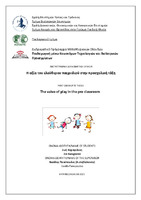| dc.contributor.advisor | PILIOURAS, PANAGIOTIS | |
| dc.contributor.advisor | Panopoulos, Vasileios | |
| dc.contributor.author | Καραγιάννη, Ζωή | |
| dc.date.accessioned | 2021-02-15T12:08:33Z | |
| dc.date.issued | 2021-02-11 | |
| dc.identifier.uri | https://polynoe.lib.uniwa.gr/xmlui/handle/11400/197 | |
| dc.identifier.uri | http://dx.doi.org/10.26265/polynoe-48 | |
| dc.description.abstract | Περίληψη
Το ημερήσιο πρόγραμμα του νηπιαγωγείου (ΦΕΚ 79 /2017) είναι διαρθρωμένο σε οργανωμένες δραστηριότητες και στην ελεύθερη απασχόληση των παιδιών στις γωνιές της τάξης, στο ελεύθερο παιχνίδι δηλαδή. Τα παιδιά μαθαίνουν καθώς κινούνται, αγγίζουν, πειραματίζονται με ευρεία ποικιλία υλικών, καθώς δοκιμάζουν τις λύσεις που δίνουν σε διάφορες καταστάσεις προβληματισμού και αξιολογούν τα αποτελέσματα των πράξεων τους. Μαθαίνουν καθώς συνεργάζονται, όταν αλληλοεπιδρούν, ακόμα και όταν διαφωνούν, μαθαίνουν δηλαδή παίζοντας. Σύμφωνα με τον Piaget, η κατάκτηση της γνώσης είναι μια ενεργητική διαδικασία και τα παιδιά οικοδομούν σταδιακά τη γνώση μέσα από τη δική τους δραστηριότητα (Σκούρα, 1991, Ferreiro, 1998).
Το ελεύθερο παιχνίδι των παιδιών στις γωνιές της τάξης, σε ένα σωστά οργανωμένο μαθησιακά περιβάλλον, σε γωνιές εξοπλισμένες με κατάλληλο εκπαιδευτικό υλικό, στη διαμόρφωση των οποίων τα παιδιά συμμετέχουν ενεργά, έχει πολύ σημαντική αξία και ρόλο στην παιδαγωγική διαδικασία. Το παιχνίδι ενοποιεί τη μάθηση, δίνει ευκαιρίες για αυτόνομες δραστηριότητες, για αλληλεπίδραση των μαθητών, υποστηρίζει της ανάπτυξη ενός θέματος που μπορεί να επεξεργαζόμαστε στην τάξη, ενθαρρύνει τη δημιουργικότητα, εξάπτει τη φαντασία, κοινωνικοποιεί, προσφέρει αυτογνωσία και αυτοπεποίθηση. Ταυτόχρονα αποτελεί ένα πολύτιμο εργαλείο στα χέρια του εκπαιδευτικού, καθώς του δίνει την ευκαιρία να παρατηρεί καλύτερα τους μαθητές, να κάνει παρεμβάσεις αν και όπου χρειάζεται, ενθαρρύνοντας παράλληλα την αυτονομία των παιδιών, να λειτουργήσει ενισχυτικά και ατομικά σε ενδεχόμενες δυσκολίες που μπορεί να διαπιστώσει. Εν ολίγοις είναι ένα άρτιο βοήθημα παρατήρησης και (αυτό)αξιολόγησης.
Με γνώμονα όλα τα παραπάνω, την αξία δηλαδή του ελεύθερου παιχνιδιού, εισηγούμαι την παρακάτω βιβλιογραφική διπλωματική εργασία διαφωτίζοντας την αξία του ελεύθερου παιχνιδιού στην προσχολική τάξη και στην ολόπλευρη ανάπτυξη των παιδιών. | el |
| dc.format.extent | 41 | el |
| dc.language.iso | el | el |
| dc.publisher | Πανεπιστήμιο Δυτικής Αττικής | el |
| dc.publisher | Ανώτατη Σχολή Παιδαγωγικής και Τεχνολογικής Εκπαίδευσης (Α.Σ.ΠΑΙ.Τ.Ε.) | el |
| dc.rights | Αναφορά Δημιουργού-Μη Εμπορική Χρήση-Όχι Παράγωγα Έργα 4.0 Διεθνές | * |
| dc.rights.uri | http://creativecommons.org/licenses/by-nc-nd/4.0/ | * |
| dc.subject | Ελεύθερο Παιχνίδι | el |
| dc.subject | Προσχολική Τάξη | el |
| dc.title | Η αξία του ελεύθερου παιχνιδιού στην προσχολική τάξη | el |
| dc.title.alternative | The value of play in the pre classroom | el |
| dc.type | Μεταπτυχιακή διπλωματική εργασία | el |
| dc.contributor.committee | Καρκαλούσος, Πέτρος | |
| dc.contributor.faculty | Σχολή Επιστημών Υγείας & Πρόνοιας | el |
| dc.contributor.department | Τμήμα Βιοϊατρικών Επιστημών | el |
| dc.contributor.master | Παιδαγωγική μέσω Καινοτόμων Τεχνολογιών και Βιοϊατρικών Προσεγγίσεων | el |
| dc.description.abstracttranslated | Abstract
The daily program of the kindergarten (Government Gazette 79/2017) is structured in organized activities and in the free employment of children in the centers of interest - corners of the classroom, that is, in free play! Children learn as they move, touch, experiment with a wide variety of materials, as they try out the solutions they give to different situations of reflection and evaluate the results of their actions. They still learn as they cooperate, when they interact, even when they disagree, that is, they learn by playing! According to Piaget, the acquisition of knowledge is an active process and children gradually build knowledge through their own activity (Skoura, 1991; Ferreiro, 1998).
The free play of children in the corners of the classroom, in a well-organized learning environment, in corners equipped with appropriate educational material, in the formation of which children actively participate, has a very important value and role in the pedagogical process. The game integrates learning, gives opportunities for autonomous activities, for student interaction, supports the development of a topic that can be worked on in the classroom, encourages creativity, stimulates the imagination, socializes, offers self-knowledge and self-confidence. At the same time, it is a valuable tool in the hands of the teacher, as it gives him the opportunity to better observe the students, to intervene if and where needed, while encouraging the autonomy of children, to act as a supporter and individually in case of difficulties he may identify. In short, it is an excellent aid for observation and (self) evaluation.
Based on all the above, the value of children's free play, we introduce the following bibliographic thesis, illuminating the value of free play in the preschool classroom.
| el |
| dcterms.embargoTerms | 12 months | el |
| dcterms.embargoLiftDate | 2022-02-15T12:08:33Z | |


